“The war changed everything!”
Dmitry is a drag queen. In his blog post, the young Ukrainian describes how he experienced the outbreak of war and where Russia’s attack ultimately led him. He had to leave his home town, his family fled and he constantly had to find new jobs. The only ray of hope: Love! Dmitry recently met someone. Our columnist Iryna Hanenkova has written down his story for us.
It’s 24 February 2022, between 7:30 and 7:35 in the morning, something like that. The phone rings – it’s my grandmother from Zaporizhia calling. I’m living in Kharkiv at the time.
- Hello, Dima, how are you in Kharkiv?
- What do you mean?
- Is it loud? Do they bomb?
- What are you talking of? I need to get ready for work. What do they bomb?
- The war has started.
- I’ll call you back.
The war has begun. These words come as a shock. I call up the news and read what’s going on. The war has indeed begun. I jump out of bed, get dressed, wake my flatmate and tell him to pack his things. As a precaution.

I would spend the next week in Kharkiv, for the very last time.
We pack everything we need, documents, food. Luckily, we had bought enough for home a few days earlier. So wise! In the late afternoon, a friend who lives alone comes to visit. I didn’t want to leave him alone with all this. We sleep in the same bed for a week – with the window open so that we can hear what’s going on outside. We’re not hungry, we don’t eat. We even forget to shower. We’re afraid of it.
We go out for the first time on 28 February because we’ve run out of cigarettes and have started smoking again because we’re so nervous. It’s the fourth day of the war. We look around the neighbourhood. There are queues everywhere. You cannot get cigarettes around; the shops seem to be closed. At the end of the street we finally find a shop that’s open.
The Russians indiscriminately bombard the centre
It’s cold outside, the sky is overcast, we can’t see a thing. We queue for two, two and a half hours. When there are left only two people in front of us, we hear aeroplanes approaching and explosions. I’ve never been more scared in my life. The planes are bombing the city centre. Everyone runs wherever they can because you can’t see the planes behind the clouds. It’s very frightening. I’ll probably never forget that feeling.
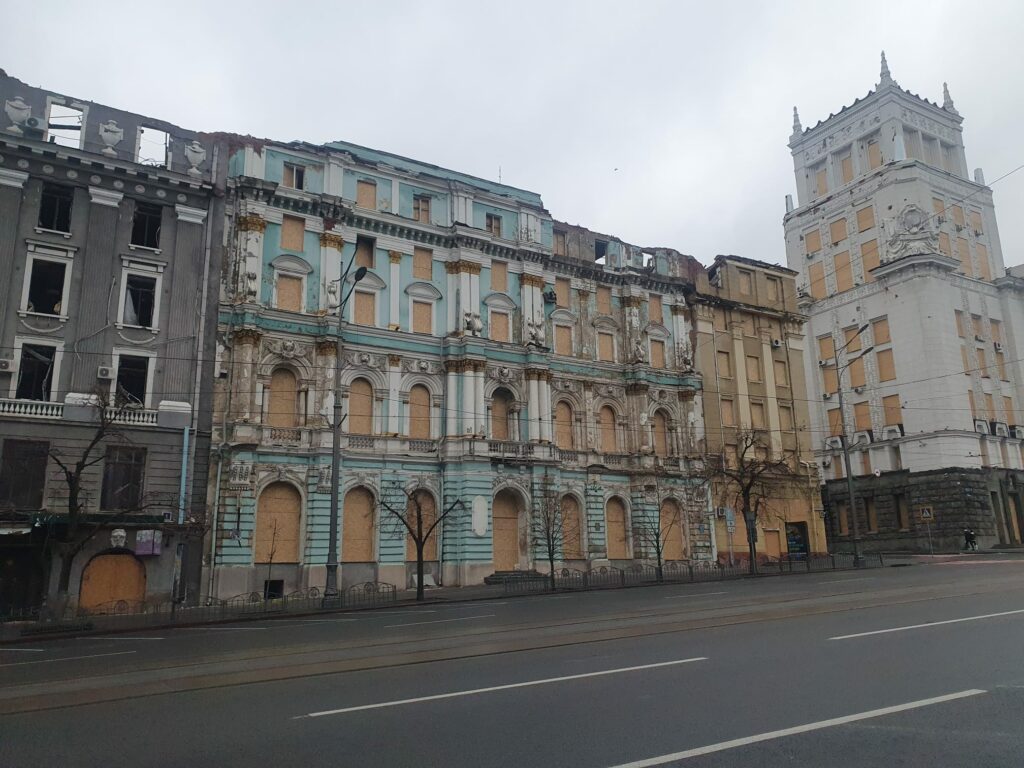
I hate the bastards who sit in these aeroplanes. The scum who built the rocket that’s flying towards me right now. It’s only 10 to 20 metres away. I can see it. That day it hits a group of people queuing at a pet shop nearby. One woman’s legs are shredded; she later dies in a hospital as a result of her injuries.
We give up to search for cigarettes and go home. The street is littered with “blind” rockets.
I fall asleep on the cold floor
In the evening again. They bomb the centre of Kharkiv with planes. The city centre, where normal people live. That evening I fall asleep in the corridor on the cold floor because I’m so exhausted.
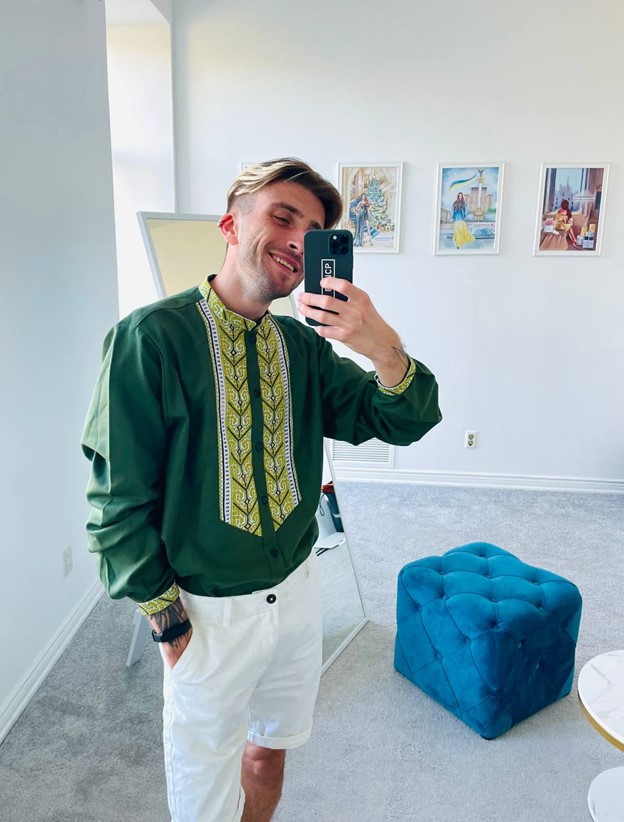
I hardly get sleep in the days that follow. The shelling usually lasts until ten or eleven at night, and then it starts again at around six or seven in the morning. My two boys fall asleep quicker than I do because I always listen to potential noises.
I soon realise that I will lose my mind if I stay here. On 2 March, I decide to leave the city I’ve lived in for two years.
In peacetime, it takes me ten minutes and between 60 and 70 hryvnia to get to the station. Now a taxi costs between 3000 and 5000 hryvnia. I don’t have that much money. A boy and his father agree to give me a lift for 1000 hryvnia. They pick me up near my house. I’m carrying a suitcase that should last me another six months. We drive through an empty, destroyed city with Russian aeroplanes circling overhead.
The train station is full of people
I am extremely grateful to these people for getting me out of here. My friends from Dnipro persuaded me to join them in the city. And so I’m waiting for the evacuation train to Dnipro – for a whole day.
The station is overcrowded with people. There are two trains with women and children on board. The station staff and volunteers are handing out milk, water and biscuits. I don’t even have any water with me, which I will regret. My brain is trying to understand what is happening around me. It’s absurd, it’s madness; it can’t be. But it is reality.
Finally, my parents!
The train to Dnipro consists of three carriages. Only three carriages for the mass of people here. You could also say: “Like a herring in a jar”. So we are crammed into the train. We hear explosions nearby. We are all afraid that this carriage could become our coffin. When the train leaves, I breathe, I am relieved. The nightmare here is over. But the uncertainty and the view out of the window don’t make it any easier. I’m insanely thirsty and there’s no water. I spend the next six hours travelling to Dnipro, half unconscious.
I stay with my friends in Dnipro for a fortnight. Then I can finally go to Zaporizhia to see my parents. I’m staying until the beginning of April.
Escape to Kyiv
Sitting at home with nothing to do. That’s the worst! I leave Zaporizhia on 6 April and drive to the capital.
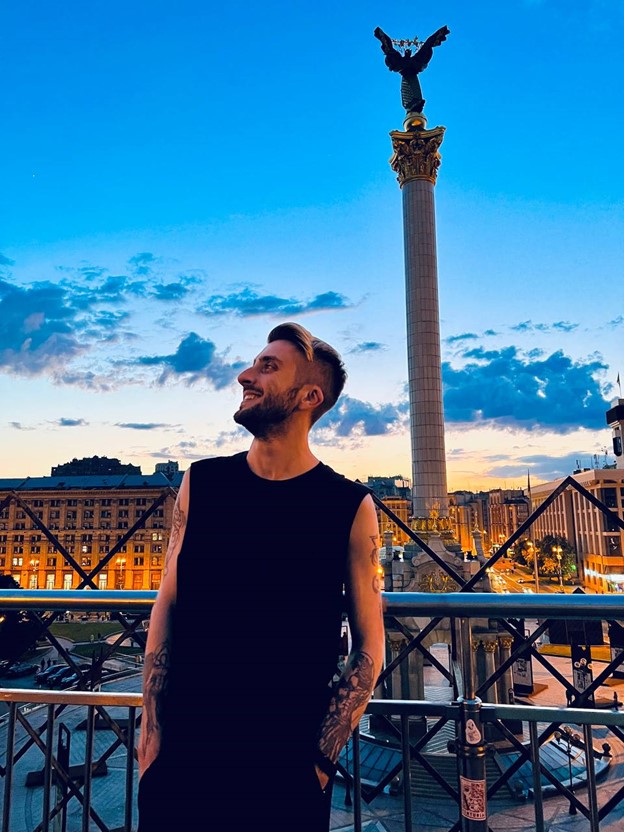
I’ve been living in Kyiv for a year and a half now. I’ve already changed jobs five times and I’m currently training to become a beauty consultant. I occasionally work as a drag queen, so it comes naturally.
In January, I helped organise a big Harry Potter performance, because I’ve always worked a lot with children. I understand that they need a fairy tale now – we all do, actually.
I had my own club project in Zaporizhia for six years. We’ve only been able to organise two parties there since the start of the war. Zaporizhia is a frontline city. It was so nice to finally have guests again.
Everything is so different now
The war changed a lot of things. It took away the family I used to see so often. My mother and sister now live in England, my father stayed in Zaporizhia with my grandmother. It’s only now that I realise how important my family has always been in my life.
The war also took my favourite city away from me. It took me a year to recover from moving. I miss my thriving, beautiful and beloved Kharkiv.
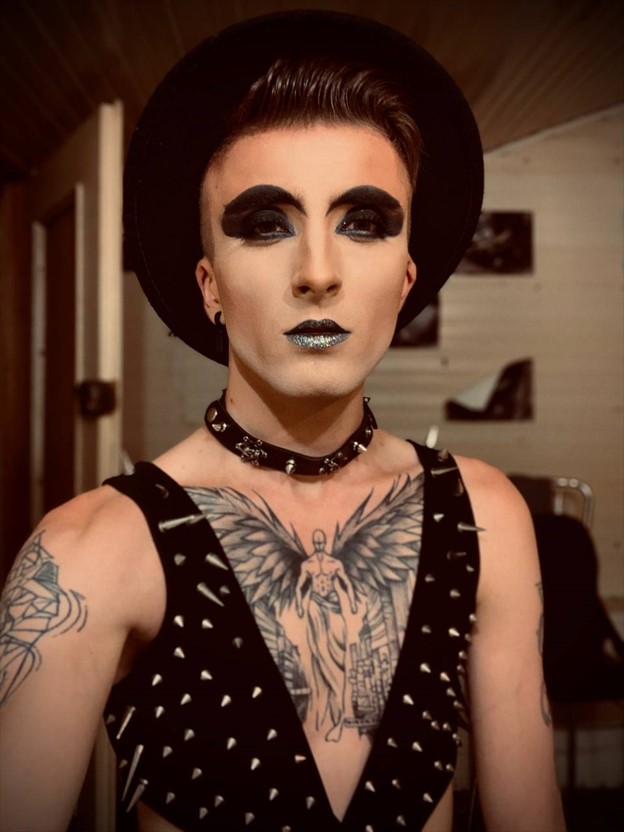
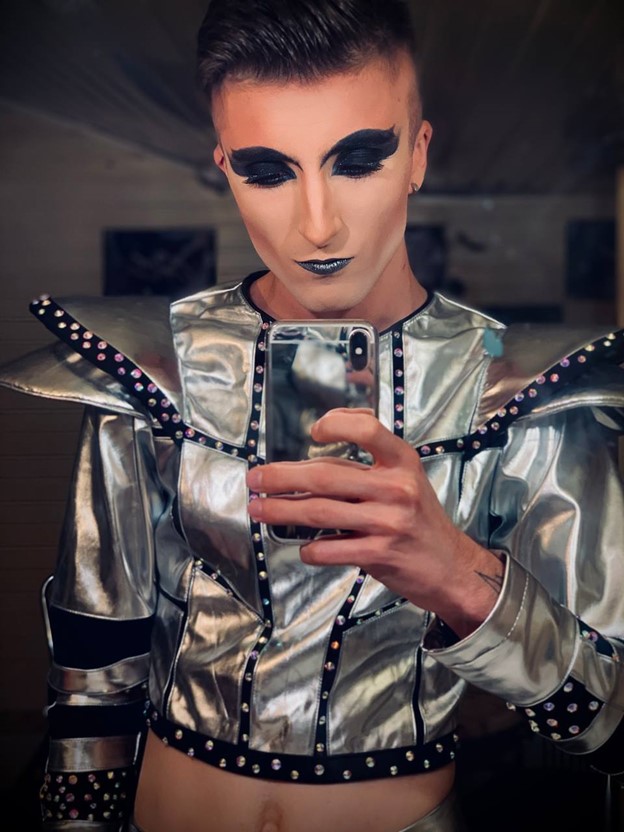

At least I’ve finally met someone I love. I was alone for six years and somehow it happened that now, four months later, it’s no longer like that. That’s probably the only thing I’m happy about.
Life goes on
I’m making plans and hope that it will all be over soon and we can all be together again. I dream of doing another cool (drag) production. But I don’t feel able to write the concept for it. Maybe one day I will, but I’m not sure.
This is how you can donate
INDIVIDUAL HELP Munich Kyiv Queer has its own fundraising campaign via https://www.paypal.me/ConradBreyer to support queer people in Ukraine who are in need or on the run. Why? Because not all LGBTIQ* are organised in the local LGBTIQ*-groups. This help is direct, fast and free of charge if you choose the option “For friends and family” on PayPal. If you don’t have PayPal, you can alternatively send money to the private account of Conrad Breyer, speaker of Munich Kyiv Queer, IBAN: DE427015000021121454.
All requests from the community are meticulously checked in cooperation with our partner organisations in Ukraine. If they can help themselves, they take over. If the demands for help exceed their (financial and/or material) possibilities, we will step in.
HELP FOR LGBTIQ* ORGANISATIONS To support LGBTIQ* in Ukraine we have helped set up the Alliance Queer Emergency Aid Ukraine, in which around 40 German LGBTIQ* Human Rights organisations are involved. All these groups have access to very different Human Rights organisations in Ukraine and use funds for urgently needed care or evacuation of queer people. Every donation helps and is used 100 percent to benefit queer people in Ukraine. Donate here
Questions? www.MunichKyivQueer.org/donations
Comments are closed.
Back to overview